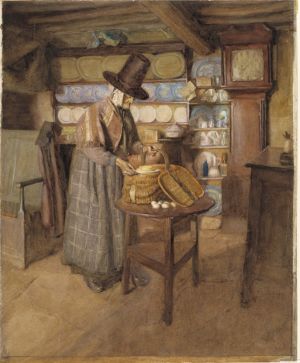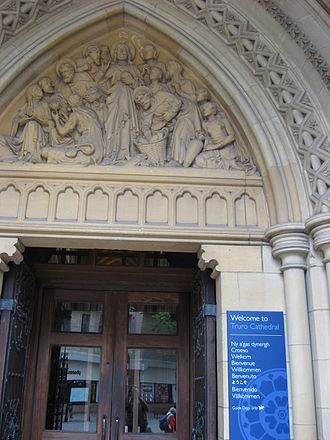Discover Your Roots
SIGN UPDiscover Your Roots
SIGN UPThe name Culture is of English origin and is primarily a gender-neutral name. It signifies "Arts And Customs" and is deeply rooted in the concept of social behavior, institutions, and norms in human societies, as well as the knowledge, beliefs, arts, laws, customs, capabilities, attitudes, and habits of individuals within these groups. The term encompasses the range of phenomena transmitted through social learning in human societies and is often attributed to a specific region or location. Culture is a central concept in anthropology, covering a wide range of expressive forms, technologies, material culture, and immaterial aspects such as principles of social organization, mythology, philosophy, literature, and science. It is a multifaceted concept that influences human behavior, values, and everyday practices, and is a key factor in the preservation of cultural heritage and diversity.

Wales boasts a rich culture, encompassing language, customs, festivals, music, art, cuisine, mythology, history, and politics. The nation is symbolized by the red Welsh Dragon, alongside the leek and the daffodil. While sharing some customs with the rest of the United Kingdom, Wales maintains its distinct traditions and culture. Notably, it has been dubbed the "land of song," owing to its eisteddfod tradition. The historical influences on Welsh culture are extensive, tracing back to the early kingdoms, such as Gwynedd, Powys, and Deheubarth. The nation's development has seen unification, conflicts, and eventual conquest by English forces. The Tudors of Penmynydd played a significant role, and Welsh nationalism has been a recurring theme, with calls for more self-determination for Wales. The national symbols of Wales are deeply rooted in its history and have become emblematic of its identity. The dragon, daffodil, and leek hold special significance, each carrying a unique story and representing the nation's rich heritage.

Scotland has a rich cultural heritage that encompasses a distinct legal system, vibrant literary tradition, unique banking and currency systems, and a wide array of sports and artistic contributions. The country's legal system, Scots Law, is based on Roman law and differs from the common law system of England. Scotland also boasts its own banking and currency systems, with three Scottish corporate banks issuing their own banknotes. In sports, Scotland is known for its prowess in golf, rugby, and shinty, and has made contributions to literature and art, with a significant literary tradition dating back to the sixth century. Notable figures in Scottish literature include Robert Burns, Walter Scott, and Hugh MacDiarmid, who played pivotal roles in shaping the country's literary landscape. Additionally, Scotland has a diverse media landscape, cuisine, folklore, languages, and religious practices, all of which contribute to the rich tapestry of Scottish culture.

The culture of Cornwall, a part of the United Kingdom, is characterized by distinct customs, traditions, and language. The Cornish language, a Celtic language related to Breton, Welsh, and Cumbric, has experienced a revival after years of decline. Despite less than 1% of the population speaking Cornish, it continues to play a significant role in Cornwall's culture, with many place names derived from the language. Furthermore, there is a healthy tradition of music in Cornish, and the language is used in official business, including by some of the region's Members of Parliament.Cornwall shares much of its cultural history with neighboring regions and has a rich tradition of literature and folklore. The earliest Cornish literature is in the Cornish language, and the region produced a significant number of passion plays during the Middle Ages. Additionally, Cornwall has a wealth of traditional folklore, including tales of giants, mermaids, and little people, which remain popular today.In the 20th century, the revival of interest in the Cornish language led to a resurgence of writing in the Cornish dialect, with poems, essays, and short stories being produced. The culture of Cornwall is a unique and vibrant part of the larger cultural tapestry of the United Kingdom.

Brittany, a historical region in northwestern France, is steeped in a rich and diverse culture influenced by Celtic, Gallic, and French traditions. The region, known as Breizh in Breton and Bretagne in French, was once an independent Duchy before its integration into France in 1491. Brittany's cultural heritage is reflected in its linguistic diversity, with Breton, a Celtic language, and Gallo, a Romance language, historically spoken in different parts of the region. Festivals such as Fest noz and the Festival Interceltique de Lorient, along with traditional music and costumes, showcase the vibrant cultural expressions of Brittany. Despite the decline of regional languages post-French Revolution, Brittany's cultural identity remains strong, with international connections to the United Kingdom and Canada. Discover the unique and dynamic culture of Brittany, a region with a rich tapestry of history and traditions that continue to thrive in the modern world.

Bristol, located in South West England, is known for its vibrant arts and sports scene. The city hosts a variety of annual events, including the Bristol International Balloon Fiesta, Bristol International Festival of Kites and Air Creations, Bristol Harbour Festival, St Pauls Carnival, and the Slapstick Festival. The city is also home to the Bristol Old Vic, a renowned theatre company founded in 1946, and the Bristol Hippodrome, a larger theatre hosting national touring productions. Other notable theaters in Bristol include the Tobacco Factory, The Brewery, Bierkeller Theatre, QEH, Redgrave Theatre, and Alma Tavern. Additionally, the city's theatre scene features a diverse range of producing companies such as Show of Strength Theatre Company, Shakespeare at the Tobacco Factory, acta community theatre, Myrtle Theatre, Cirque Bijou, Desperate Men, Theatre West, and Travelling Light Theatre Company. Bristol's cultural landscape is further enriched by the Bristol Art Library, Bristol Festival of Ideas, and the biennial Wildscreen Festival, showcasing wildlife filmmaking. The city's rich artistic heritage and lively events make it a hub for cultural enthusiasts and visitors.
All images displayed on this page are sourced from Wikipedia or Wikimedia Commons.We use these images under their respective Creative Commons or public domain licenses. Wherever applicable, author attributions and license information are provided. If you believe an image is used incorrectly or outside its license terms, please contact us so that we can review and correct the issue.